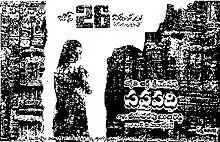Saptapadi (1981 film)
Saptapadi (transl. Seven steps) is a 1981 Indian Telugu-language drama film written and directed by K. Viswanath.[1] The film garnered the National Film Award for Best Feature Film on National Integration.[2][3] The film is not only about the seven steps that one takes to become a part of the institution of marriage and a ritualistic exercise that completes the act of shedding the bachelorhood and entering a more stable state, but talks about an individual's journey breaking away from the shackles from the conservatism to finding a path of understanding, encompassing and enlightenment. The film was premiered at the International Film Festival of India, and the AISFM film festival.[4] It was later remade in Hindi as Jaag Utha Insan in 1984, also directed by K Vishwanath.[5]
| Saptapadi | |
|---|---|
 Theatrical Release poster | |
| Directed by | K. Viswanath |
| Produced by | Bhimavarapu Buchhireddy |
| Written by | K. Viswanath Jandhyala (dialogues) |
| Starring | J.V. Somayajulu Allu Rama Lingaiah P. Ravi Shankar Sabita Bhamidipati RaviKanth Dubbing Janaki Girish Pradhan |
| Music by | K. V. Mahadevan Veturi Sundararama Murthy (Lyrics) |
| Cinematography | Kasturi |
| Edited by | G. G. Krishna Rao |
Production company | Jyothy Art Creations |
Release date |
|
| Country | India |
| Language | Telugu |
Plot
Saptapadi deals with the transformation of an individual so devoted to (mired in) the concept of rituals, that it takes an act of God (will be discussed shortly) for him to realize the true spirit behind the rituals and true meaning of the prayers. Yajulu is a man of great conviction. According to him rules and customs, that have been passed down generations thus standing the test of the time, are there for a reason and hence are immutable; traditions are trademarks of a culture and customs, its signature. He does not mind losing his daughter for his principles.
He is well into his twilight years which give him even more reason to not mend his ways. In his footsteps follows his Gaurinadha (grandchild from his son), gearing up to be a head priest at the local temple. Yajulu's will prevails over Hema's (grandchild from his daughter) wish and Gauri and Hema end up being married. However, Hema is secretly in love with a flutist, who is not of her caste. The brilliance of Viswanath comes full fore at this point, when on the first night, Gauri witnesses Durga devi in Hema, and walks out of the room completely shaken up. Gaurinadha, being an ardent devotee of the Devi, realizes that his wife is in love with another man, hence she is like a mother to him, nothing more, nothing less. This act of God triggers Yajulu's thought process to seriously question, for the first time in his life, the validity of his position on matters that involve caste, creed and religion, justifying the steps that Yajulu takes one a time, from the first one in trying to understand Hema's real interests till the last one, when he sees her off with her love interest on the boat.
The crux of the whole film is contained in a beautiful conversation that happens between the characters played by Allu Rama Lingaiah and J.V. Somayajulu.
Cast
- J. V. Somayajulu as Yajulu
- Allu Ramalingayya as Raju
- J. V. Ramana Murthy as Avadhani, Yajulu's son
- Dubbing Janaki as Annapurna, Avadhani's wife
- Ravikanth as Gowrinatha Sastry, Yajulu's grandson
- Bhamidipati Sabita as Hema
- Girish Pradhaan as Haribabu
- Jhansi as Katyayani
- Prameela Rani as Karuna
- Sivaparvathi as Raju's daughter
- Sakshi Ranga Rao as Chayanulu
Soundtrack
All music is composed by K. V. Mahadevan.
| No. | Title | Lyrics | Singer(s) | Length |
|---|---|---|---|---|
| 1. | "Akhilandeswari Chamundeswari" | Veturi Sundararama Murthy | P. Susheela, S. P. Balasubramaniam | |
| 2. | "Ayigiri Nandini" | Adi Sankaracharya | S. P. Balasubramaniam | |
| 3. | "Bhamane Satyabhamane" | Veturi Sundararama Murthy | S. Janaki | |
| 4. | "Govullu Tellana" | Veturi Sundararama Murthy | S. Janaki, S. P. Balasubramaniam | |
| 5. | "Marugelara O Raghava" | Thyagaraja | S. Janaki | |
| 6. | "Nemaliki Nerpina Nadakalivi" | Veturi Sundararama Murthy | S. Janaki | |
| 7. | "Om Jatavedase" (Sri Durga Suktam) | S. P. Balasubramaniam, S. Janaki | ||
| 8. | "Vrepalliya Eda Jhalluna" | Veturi Sundararama Murthy | P. Susheela, S. P. Balasubramaniam | |
| 9. | "Ye Kulamu Needante" | Veturi Sundararama Murthy | S. P. Balasubramaniam, S. Janaki |
Awards
| Year | Nominee / work | Award | Result |
|---|---|---|---|
| 1981 | Kasinathuni Viswanath | Nargis Dutt Award for Best Feature Film on National Integration | Won |
| 1981 | Kasinathuni Viswanath | Nandi Award for Best Screenplay Writer | Won |
| 1981 | Kasinathuni Viswanath | Filmfare Award for Best Film – Telugu | Won |
References
- "సప్తపది: వర్ణాంతర వివాహానికి వినూత్న విచారం" (PDF). Zamin Ryot. 10 July 1981. Retrieved 30 August 2020.
- http://www.earlytollywood.com/2008/02/saptapadi-1980.html
- Articles : Movie Retrospect : Retrospect : Saptapadi (1981)
- The films of K. Viswanath — AISFM Blog
- https://web.archive.org/web/20111113183906/http://www.telugucinema.com/c/publish/movieretrospect/Retrospect_Saptapadi_1981_2.php